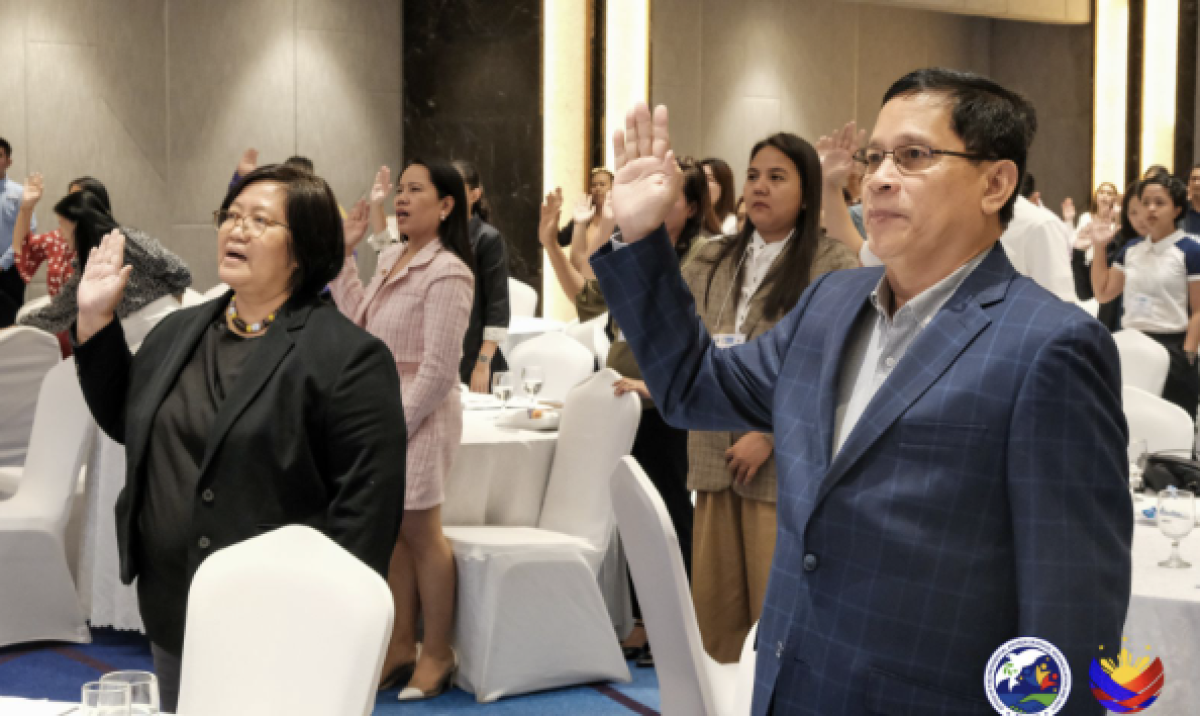Peace champions express their commitment to mainstream peace education in their respective fields. (Photos courtesy: OPAPRU)
President Ferdinand R. Marcos Jr. emphasized the crucial role of communication in enriching public discourse and enhancing the quality of governance.
The president made the statement as he issued Proclamation No. 308, declaring the month of October as "Communications Month" in the Philippines. The president’s initiative highlights the significance of open and informed dialogue in the nation-building process.
In line with this commitment to effective communication, the administration of PBBM has also recognized the importance of mainstreaming peace education toward a just and lasting peace and development in the country.
Peace education is a vital component of creating a harmonious and just society, as it equips individuals with the knowledge and skills necessary to resolve conflicts, promote understanding, and build a more peaceful world. Here's why mainstreaming peace education is pivotal for nation-building.
During the recent 2nd National Peace Education Summit hosted by the Presidential Adviser on Peace and Reunification and Unity (OPAPRU), the event brought together key government agencies, including the Department of the Interior and Local Government (DILG), the Commission on Higher Education (CHED), and the Department of Education (DepEd), to express their unwavering support for the mainstreaming of peace education at all levels of Philippine society.
DILG Secretary Benjamin C. Abalos, Jr., on his part, emphasized the importance of peace education at the community level, beginning with barangays. By integrating peace education into these local units, the government ensures that peacebuilding starts from the ground up, involving young and passionate individuals who are eager to make a difference in their respective communities.
“We will make sure that peace education will be mandatory in all barangays. I commit to that on this day,” said Secretary Abalos, who threw his agency’s support in strengthening the teaching of peace education at the community level.
“Let’s have a program for all the barangays to have a seminar for all of our SKs (Sangguniang Kabataan) after this election so that this program of peace education will [start at] the grassroots [level],” he added.

The DILG chief has also decided to include peace education as one of the criteria for local government units to be awarded the Seal of Good Local Governance (SGLG). This recognition promotes transparency and accountability in governance, aligning local leaders with the principles of peace and unity.
For the higher education community, CHED Chairperson Secretary Prospero E. De Vera recognized the pivotal role of higher education institutions in shaping the future of society.
“Our institutions of higher learning have a pivotal role to play in shaping the future of our society and by embracing peace education, we can pave the way for a more harmonious and just world,” De Vera said.
By embracing peace education, these institutions can contribute to creating a more harmonious and just world. The CHED has issued memoranda that support the integration of peace education into higher education curricula.
These include CHED Memorandum Order (CMO) No. 1, s. 2019, which calls for the integration of peace education/studies into relevant higher education curricula, and CMO No. 42, s. 2021, which recommended guiding principles and practices on peace education for higher education institutions.
For the Department of Education led by concurrent Secretary and Vice President Sara Z. Duterte, their "MATATAG Curriculum" promotes peace, community support, education, and vocations among students.
“The recently launched MATATAG Curriculum teaches students to support peace, assist their families and communities, and prioritize education and vocations,” Duterte said, also citing the significance of "reigniting education for peace and sustainable development towards a resilient Philippines."
By infusing peace education into the curriculum, the DepEd aims to nurture a generation that prioritizes peace, unity, and the welfare of their communities.
The government is also actively engaging with academic institutions to ensure that peace education is mainstreamed across the country's education system. This collaboration is integral to the national government's efforts to bring peace, reconciliation, and unity to all Filipinos.
This, however, goes beyond the mere development of a curriculum. It aims to build competencies, values, and practices that can be applied in daily life to foster a culture of peace and harmony. This approach is crucial for generating important lessons on peace negotiations, conflict resolution, human fraternity, justice, and unity.

Presidential Peace Adviser Secretary Carlito G. Galvez, Jr. expressed his gratitude to peace education champions for their commitments.
“Your presence here symbolizes your steadfast commitment to help in the national government’s efforts to guide our children and youth to become instruments of peace in our communities and beyond,” Galvez said.
Moreover, the government's peace education endeavors to leave no one behind, especially the younger generation and the most vulnerable members of society, including women, the poor, and indigenous peoples. Everyone must play an integral part in the peacebuilding process.
By mainstreaming peace education, the Philippines is taking a significant step towards fostering a more peaceful and united nation. In a world where communication and information are vital components of governance and nation-building, the government's commitment to promoting peace education aligns with its goal of nurturing a well-informed and enlightened citizenry.
This education also equips Filipinos with the tools they need to resolve conflicts, promote understanding, and contribute to the building of a just and harmonious society, ultimately strengthening the nation as a whole. (PIA-NCR)




